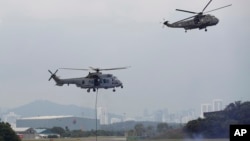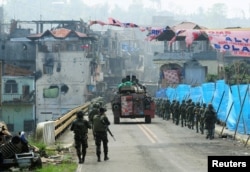Indonesia, Malaysia and the Philippines began coordinated air patrols Thursday to intensify their fight against Islamic militants who have laid siege to a southern Philippine city.
The start of the air patrols comes four months after the three countries launched joint maritime patrols to prevent Islamic State group-aligned militants in the southern Philippines from fleeing to neighboring nations.
The siege in the Philippine city of Marawi has raised fears that the Islamic State group's violent ideology is gaining a foothold in the country's restive south, where Muslim separatists have fought for greater autonomy for decades.
Malaysian Defense Minister Hishammuddin Hussein said Thursday the conflict shows that terrorist organizations affiliated with the Islamic State group have exploited the region's porous borders and linked up with local terrorist groups.
He said the air and maritime patrols are aimed at "deterring the use of these back channels and counter the movement of violent extremists and terrorists across the borders of our three nations." It is especially important to secure the sea lanes because about $40 billion worth of trade transits through the Sulu Seas each year, he said.
Hishammuddin said the three countries will take turns each month patrolling the seas with aircrews from all three countries on board.
A ceremony at a Malaysian air base launching the air patrols was attended by the Philippine and Indonesian defense ministers, along with security officials from Singapore and Brunei who acted as observers.
Authorities in Indonesia, the world's most populous Muslim nation, have carried out a sustained crackdown on militants since bombings on Bali in 2002 by al-Qaida-affiliated radicals that killed 202 people. In recent years, it has faced a new threat as the rise of the Islamic State group in the Middle East has breathed new life into local militant networks and raised concerns about the risk of Indonesian fighters returning home from fighting with IS.
Predominantly Muslim Malaysia has also detained more than 300 people in the past three years believed to be linked to IS.





